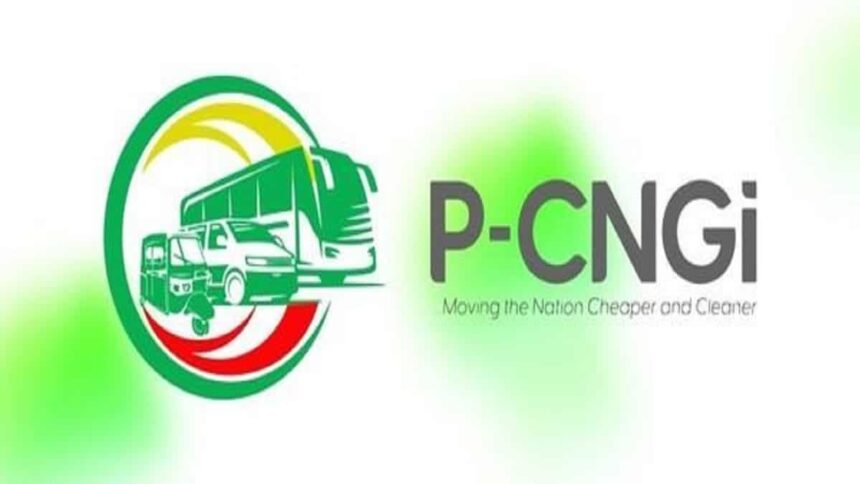…Unveils plans to expand CNG penetration to 30 states
The Presidential Compressed Natural Gas Initiative (PCNGI) has attracted over $491 million in private sector investments within its first year of operation, Project Director and Chief Executive, Michael Oluwagbemi, disclosed on Monday during a press briefing at the Presidential Villa, Abuja on Monday.
Describing the milestone as a major leap toward transforming Nigeria’s transportation and energy sectors, Oluwagbemi said the initiative has also created over 9,000 direct and 75,000 indirect jobs, with more than 30,000 vehicles converted to CNG.
“The PCNGI has not only lowered the cost of living for Nigerians but also created real jobs, stimulated industrial growth, and enhanced environmental sustainability,” he said, adding that the $491 million investment was made possible through stakeholder confidence and government-backed incentives.
The PCNGI was launched by President Bola Tinubu on October 1, 2023, as a flagship response to the removal of fuel subsidies.
It seeks to accelerate the adoption of Compressed Natural Gas (CNG) and Electric Vehicles (EVs) in public and private transport, as a cleaner, cheaper alternative to petrol and diesel.
Oluwagbemi noted that over 200 new vehicle conversion centers have been established, up from just seven at the program’s inception, as part of the Conversion Incentive Programme (CIP).
The programme, announced in August 2024, targets 1 million free or subsidized conversions, particularly for public transport vehicles, ride-share operators, and Ministries, Departments and Agencies (MDAs).
ALSO READ: Nigeria, Saudi Arabia tighten noose on drug cartels as NDLEA, GDNC sign MoU
“To date, more than 10,000 conversions are projected by the end of this quarter under the CIP. This includes deployment of 22,000 conversion kits and training of over 3,000 new technicians,” he said.
He also revealed plans to expand the CIP to public servants through a financing partnership with CreditCorp, allowing workers to convert vehicles at a discounted rate.
Under the programme, 421 CNG buses and 36 EV buses have already been delivered, out of the 655 procured by the Federal Ministry of Finance.
These buses are being deployed in partnership with the Ministry of Transportation, labour unions (NLC/TUC), and state governments.
The buses form the backbone of the Renewed Hope Mass Transit Scheme, which began during the 2024 Yuletide and is now running commercially, offering cheaper intra-city transportation options.
Oluwagbemi acknowledged the challenge of CNG availability at the last mile, resulting from rapid adoption.
However, he announced the Refueling On-Lending Programme – an aggressive gas infrastructure plan to address bottlenecks.
Under this initiative he said, 25 key sites across 15 states are receiving subsidized equipment for refueling stations.
The first site in Kwara State is operational, with others in Kogi, Ekiti, Rivers, and Abuja coming online by May 1.
By June 2025, CNG will be available in 17 states, expanding to 30 states by year’s end.
Private sector partners are also playing a key role: NNPC has deployed 12 CNG stations, with 8 more coming this quarter.
NIPCO has 22 operational daughter stations with 8 under construction.
Bovas, AY Shafa, Ibile Oil and Gas, MBH, and Mikano are all building out infrastructure.
Mikano’s mother station in Ogun, the largest in Nigeria, will serve heavy-duty trucks and significantly cut food and goods transport costs.
To further curb inflation and cut logistics costs, the PCNGI will soon launch a Diesel Conversion Programme, targeting the haulage industry.
“A converted diesel truck can cut operational costs by up to 80%. This is essential in reducing food inflation and improving supply chain efficiency,” Oluwagbemi stated.
In collaboration with the Federal Ministry of Education and Midstream Downstream Gas Infrastructure Fund (MDGIF), PCNGI will also roll out discounted CNG services and training programmes in 20 federal universities.
The program includes: Discounted vehicle conversions for university staff, on-campus CNG bus and tricycle services, accredited technical training under a new TVET initiative and development of refueling infrastructure to support university communities.
The first six universities will begin operations by the end of Q2 2025.
Responding to concerns about CNG safety, Oluwagbemi revealed the launch of the Nigeria Gas Vehicle Monitoring System (NGVMS) in partnership with SON, NADDC, NMDPRA, and FRSC.
The system will ensure only certified vehicles can access refueling stations.
He clarified that the only major incident reported – last year’s explosion in Benin – was due to illegal CNG cylinder fabrication by saboteurs, who have since been arrested.
To ensure stable gas supply, PCNGI—through the NNPC, Nigeria Gas Marketing Limited, and other stakeholders – has finalized a Mobility CNG Framework to unlock 100 mmscfd/day of gas supply for vehicles at preferential prices.
This framework will go live within 2 to 4 weeks, ensuring that every CNG vehicle can refuel affordably while eliminating price arbitrage.
Oluwagbemi thanked President Tinubu for his unwavering support, and praised the Ministries of Finance and Petroleum (Gas) for enabling the program’s success.
“This initiative is not just about alternative fuels – it’s about jobs, climate action, reduced costs, and national pride. We are building a better future, one CNG vehicle at a time,” he concluded.






